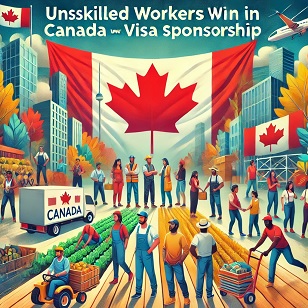Unskilled Jobs in Canada with Visa Sponsorship in 2024 and 2025
Canada remains a global hotspot for immigrants seeking employment opportunities, including unskilled jobs that require minimal qualifications. The country’s labor shortages in key industries, combined with favorable immigration policies, make it possible for workers without specialized skills to secure employment with visa sponsorship.
This guide explores everything you need to know about unskilled jobs in Canada, visa sponsorship programs, application strategies, and inspiring success stories.
Key Industries for Unskilled Jobs
1. Agriculture and Farming
Canada’s agricultural sector depends heavily on foreign labor to meet seasonal and long-term demands. Roles include fruit picking, vegetable harvesting, livestock management, and greenhouse operations.
- Benefits: Visa sponsorship, subsidized housing, and access to pathways for permanent residency.
- Pay: Workers typically earn between $15–$18 CAD per hour.
2. Hospitality and Tourism
Hotels, restaurants, and resorts frequently hire unskilled workers for roles like housekeeping, dishwashing, and maintenance. As a significant part of Canada’s economy, this sector is a major employer of foreign workers.
- Benefits: Employers often provide accommodations and additional perks such as meals or transportation.
- Pay: Hourly wages range from $14–$17 CAD.
3. Construction and Manufacturing
General labor positions, assembly line roles, and factory jobs are available in construction and manufacturing industries. Many of these roles provide on-the-job training.
- Benefits: Visa sponsorship opportunities and training for technical roles.
- Pay: Hourly rates can go from $15–$20 CAD depending on the job location and employer.
4. Caregiving
With a growing aging population, caregiving has become a high-demand field in Canada. This includes in-home care for seniors or people with disabilities and childcare through live-in arrangements.
- Programs: Pilots like the Home Child Care Provider and Home Support Worker programs offer pathways to permanent residency.
- Pay: Caregivers can earn $16–$22 CAD per hour.
5. Food Processing
Processing plants often require unskilled workers for packaging, meat cutting, and factory cleaning. These roles are integral to Canada’s food supply chain.
- Pay: Workers typically earn $14–$18 CAD per hour.
Visa Sponsorship Pathways
Canada provides structured pathways for unskilled workers through various immigration programs:
1. Temporary Foreign Worker Program (TFWP)
The TFWP allows Canadian employers to hire foreign workers for temporary positions when no local candidates are available. A Labor Market Impact Assessment (LMIA) ensures the employer has made an effort to recruit Canadian residents before turning to foreign workers.
2. Seasonal Agricultural Worker Program (SAWP)
This program is designed for agricultural workers from specific countries. It enables foreign laborers to work in Canada for up to eight months per year, with the option to return annually. Employers typically sponsor visas and provide housing.
3. Provincial Nominee Programs (PNPs)
Many provinces have streams under PNPs for unskilled workers. For example:
- British Columbia: Hospitality and food-processing streams.
- Manitoba: General labor in agriculture and manufacturing.
Workers with valid job offers and relevant experience can apply for permanent residency under these programs.
4. Caregiver Programs
Programs like the Home Child Care Provider Pilot and Home Support Worker Pilot allow foreign caregivers to work in Canada while offering a direct pathway to permanent residency after 24 months of work.
Unskilled Jobs in Canada with Visa Sponsorship in 2024 and 2025
How to Apply
- Research Opportunities: Identify industries or provinces experiencing labor shortages. Focus on sectors like agriculture, caregiving, and hospitality, where visa sponsorship is common.
- Prepare Your Application:
- Tailor your resume to Canadian standards. Highlight relevant experience even if informal or from volunteering.
- Obtain certifications if required for specific roles, such as caregiving or food handling.
- Secure a Job Offer: Network through recruitment agencies, attend virtual job fairs, or connect directly with employers in Canada who have an LMIA approval to sponsor foreign workers.
- Apply for a Work Visa: Once you receive a job offer, follow the steps outlined by the employer to secure your visa and travel to Canada.
Real-Life Success Stories
1. Maria’s Journey from the Philippines
Maria arrived in Canada as a fruit picker under the Seasonal Agricultural Worker Program. Over the years, her dedication earned her a promotion to team leader, and her employer supported her permanent residency application. Today, Maria owns her own home in Ontario.
2. John’s Transition to Permanent Residency
John, a caregiver from Kenya, joined the Home Support Worker Pilot to assist an elderly couple in Vancouver. His hard work and close relationship with his employers allowed him to bring his family to Canada after two years. He now runs a caregiving business employing other newcomers.
3. Raj’s Career in Manufacturing
Raj from India started as an assembly line worker in a Toronto factory. His employer sponsored his visa and later nominated him through the Ontario Provincial Nominee Program. Raj has since become a permanent resident and continues to work in Canada’s thriving manufacturing sector.
Challenges and Tips
Challenges:
- Competition for visa sponsorship roles can be high.
- Some jobs may involve physically demanding tasks or irregular hours.
- Language barriers can hinder initial job performance.
Tips for Success:
- Learn basic English or French to communicate effectively in the workplace.
- Be flexible and open to working in rural areas where labor shortages are more acute.
- Research cultural norms and workplace etiquette in Canada.
- Save money for initial expenses like travel, visa processing, and basic accommodation.
Conclusion
Unskilled jobs in Canada provide incredible opportunities for individuals willing to work hard and adapt. These positions not only offer financial stability but also open doors to permanent residency, making them a perfect fit for those seeking a brighter future.
While the journey may seem daunting, the experiences of people like Maria, John, and Raj prove that success is attainable with persistence and dedication. Take the first step today—your Canadian dream is within reach!






